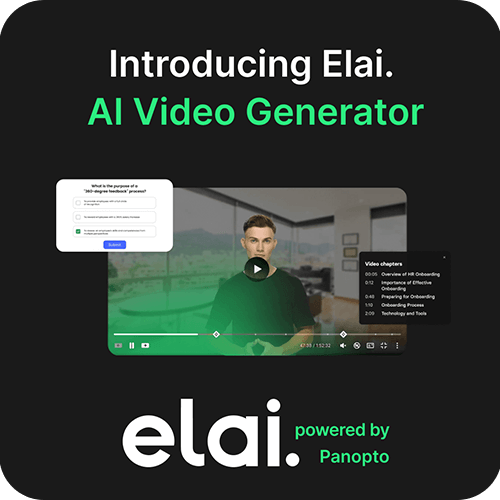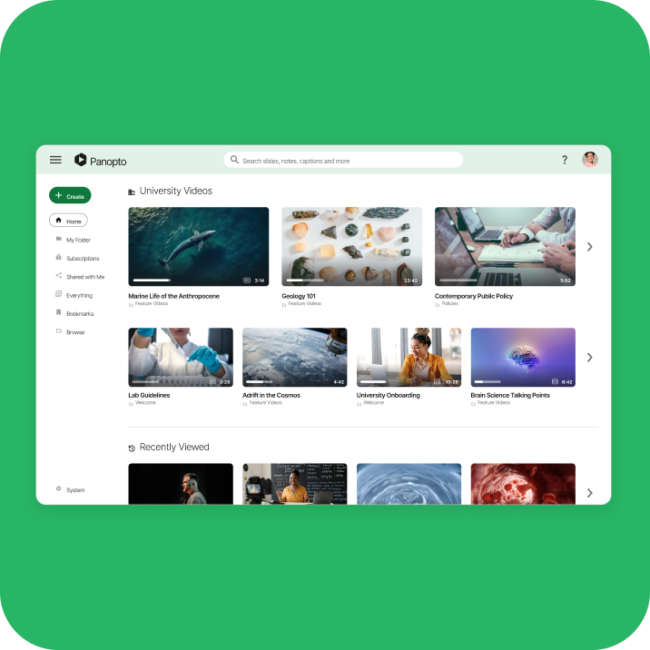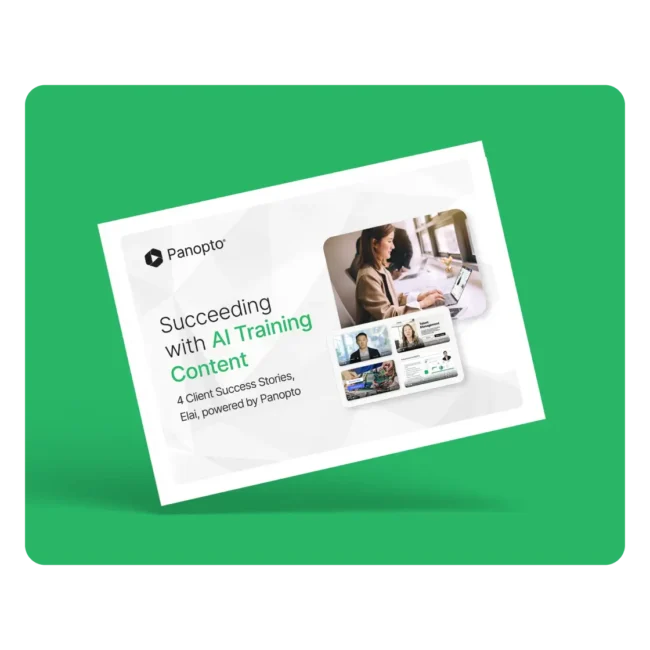- トレーニング
コンピテンシー別学習: エンタープライズトレーニングの大革命

目まぐるしく変化するビジネスの世界では、一歩先を行くためには、新たな課題に迅速に適応できる人材が必要です。 コンピテンシーベースの学習(CBL) は、進化するニーズや課題に迅速に適応できる熟練した労働力を開発するための重要な戦略となっています。 この学習モデルは、キャリアステージに関係なく、学習者が自分の役割に必要な重要な能力の習得を実証することに焦点を当てています。 従来の期限付きトレーニングプログラムとは異なり、CBLは着席時間よりもスキルを優先するため、従業員の能力開発に対するよりパーソナライズされた効率的なアプローチが可能になります。
動画を活用したトレーニングの台頭により、企業の世界でのCBLの有効性は大幅に向上しました。Panoptoのような動画テクノロジーにより、企業は現代の職場環境の要求に合わせた、魅力的で柔軟性があり、スケーラブルな学習ソリューションを提供できます。
企業におけるコンピテンシーベースの学習とは?
企業の文脈では、コンピテンシーベースの学習は、従業員が昇進する前に示さなければならない特定の仕事関連のスキルと知識に焦点を合わせます。 このアプローチは、テクノロジー、コンプライアンス基準、ビジネスプロセスを常に把握することが成功に不可欠な業界で特に役立ちます。 たとえば、IT部門では、従業員はより高度なプロジェクトを引き受ける前に、特定のプログラミング言語を習得する必要があるかもしれません。 営業では、CRMソフトウェアの習熟度を証明することは、より大きなアカウントを処理するための足がかりになる可能性があります。
一定のトレーニング時間やモジュールを中心に構成された従来のトレーニングモデルとは異なり、コンピテンシーベースの学習では、トレーニングセッションに費やす時間ではなく成果に重点を置いて、すべての学習者が自分のペースで必要なレベルのコンピテンシーに到達できるようにします。
ビジネスにおけるコンピテンシーベースの学習における動画の役割
動画テクノロジーは、ビジネスにおけるコンピテンシーベースの学習を提供し、サポートする上で重要な役割を果たします。 動画が企業の学習プログラムを変革する4つの方法をご紹介します。
- 多忙なプロフェッショナルのための非同期学習
企業研修における最大のハードルの1つは、忙しい専門家のスケジュールに対応することです。 動画コンテンツは 非同期学習が可能なため、社員は休憩時間や仕事帰り、移動中など、都合の良いときに研修資料にアクセスできます。
調査によると、 94% の組織が 、動画トレーニングは従来の対面式のトレーニング セッションよりも柔軟な学習スケジュールを可能にすることに同意しています。
のようなプラットフォームを使用すると 、 組織はオンデマンド トレーニングPanopto ライブラリを作成し、学習者がコンテンツを完全に理解するまで動画を視聴、一時停止、再生、レビューできます。この柔軟性により、従業員は先に進む前にスキルを習得できます。 たとえば、企業が新しいソフトウェアを展開するとき、動画チュートリアルはスタッフがスピードアップするのに役立ちます。 従業員は自分のペースで視聴し、学習できるため、情報を保持し、効果的に適用することが容易になります。
- 職務に特化したスキルを活かす
多くのエンタープライズジョブには、従来のテキストベースのトレーニングでは伝えにくい複雑なタスクが含まれることがよくあります。 動画は、特定の能力、特に実践的なスキルを必要とする能力を示すのに効果的な媒体です。
例えば、 製造業では、動画チュートリアルで専用機器の操作方法を順を追って示すことができ、タスクがどのように行われているかを正確に把握しやすくなります。 カスタマーサービスでは、動画が困難な顧客とのやり取りを処理するためのベストプラクティスを示し、従業員に実際のシナリオを提供する場合があります。
さらに、動画ベースの スキル評価では 、従業員が技術的なスキル、セールスピッチ、リーダーシップのテクニックなど、主要なコンピテンシーを実証している様子を記録することができます。 その後、マネージャーやトレーナーはこれらの録画を評価できるため、筆記試験よりも信頼性の高い方法で従業員のスキルを評価できます。
- グローバルな労働力のためのスケーリング
企業のトレーニングで動画を使用する大きな利点の 1 つは、地理的に分散した大規模な従業員に 学習プログラムを拡大 できることです。 企業は、トレーニングのために従業員を中央の場所に配置する必要がなくなりました。それどころか、世界中の学習者がアクセスできる動画コンテンツを作ることができます。
これは、異なる地域のオフィス間で のトレーニングの一貫性 を確保する必要がある多国籍企業にとって特に価値があります。 動画は一貫した学習体験を提供し、すべての従業員がどこにいても同じ品質の指導を受けられるようにします。 また、多くの従業員を短期間で新入社員研修することが容易になります。
Panoptoのようなプラットフォームは、自動音声認識(ASR)、字幕、20+言語のリアルタイム翻訳機能を備えた多言語動画プラットフォームを使用して、グローバル学習への障壁を打ち破ることができます。これにより、あらゆる背景、学習スタイル、言語の好みの学習者が、必要な知識を自分の言葉でアクセスできるようになります。
- フィードバックの合理化と継続的な評価
コンピテンシーベースの学習では、学習者が必要なコンピテンシーを開発し、実証していることを確認するための継続的な評価が必要です。 動画テクノロジーにより、マネージャーやトレーナーは学習プロセス全体を通じて パーソナライズされたフィードバック を簡単に提供できます。
たとえば、従業員は、製品のデモや技術的な手順など、自分の作業の動画録画をレビューのために提出する場合があります。 その後、マネージャーは特定のタイムスタンプ付きのフィードバックを提供できるため、従業員は改善が必要な場所を正確に理解できます。 このリアルタイムの視覚的なフィードバックループは、特にパフォーマンスベースのスキルを評価する場合に、従来の書面による評価よりもはるかに効果的です。
また、動画ベースの評価により、企業は時間の経過に伴う進捗状況を追跡し、どの従業員が特定のコンピテンシーを習得し、どの従業員が追加のサポートを必要としているかについての洞察を得ることができます。 Panopto のようなプラットフォームは、企業が従業員のエンゲージメント、進捗状況、および結果を監視するのに役立つ分析を提供します。
動画対応CBL for Enterprisesのメリット
動画を活用したコンピテンシーベースの学習は、絶えず変化する市場で従業員のスキルアップと競争力の維持を目指す企業にとって、多くのメリットを提供します。
- 従業員エンゲージメントの向上
動画コンテンツは、従来のテキストベースのトレーニング方法よりもはるかに魅力的です。 従業員は、現実世界のデモンストレーション、インタラクティブな要素、学習体験を制御する機能など、動的なコンテンツに関与し続ける可能性が高くなります。 さらに、エンゲージメント分析機能は、トレーナーに貴重な洞察を提供できます。
- 費用対効果が高く、時間を節約できます
動画ベースの学習は、特に移動や対面式の指導に関して、トレーニングに関連するコストを大幅に削減できます。 実際、動画を学習に利用している企業は、全体的なトレーニング費用を 節約できる可能性が40%高く なっています。 動画は一度作成すると、複数の従業員コホートで再利用できるため、ライブトレーニングを繰り返す必要がなくなります。 さらに、動画は リモート評価を可能にし、コンピテンシー評価の品質を維持しながら、時間とリソースの両方を節約します。
- スキル保持と習熟度の向上
動画は、学習者が自分のペースで何度もコンテンツを復習できるので、 スキルの定着率を高めることができます。 従業員は、自分がよく理解している分野を迅速に進める一方で、やりがいのあるコンピテンシーにより多くの時間を費やすことができ、前進する前に習得を確保できます。
動画 企業におけるトレーニングアプリケーション
すでに多くの業界では、動画を活用したCBLを活用して、従業員のトレーニングと能力開発を改善しています。 たとえば、 金融サービス 業界の企業は、動画を使用してコンプライアンス規制について従業員をトレーニングし、機密性の高い顧客データを取り扱う前に十分な理解を示すようにしています。
ヘルスケア業界では、動画を通じたコンピテンシーベースの学習により、スタッフや医師は変化する医療水準、進化するプロセス、最新のコンプライアンス要件を常に把握し、患者ケアを合理的かつ一貫して提供することができます。
課題と今後の展望
動画を活用したコンピテンシーベースの学習のメリットは明らかですが、企業によってはコンピテンシーベースの学習を困難だと考える人もいるかもしれません。 結局のところ、拡大する動画トレーニングライブラリに供給するのに十分な動画コンテンツを制作すると同時に、制作基準とカタログ化技術のバランスをとることは簡単なことではありません。 完璧ではなく進歩を受け入れるというマントラは、次のことを考えてみてください。
- 携帯電話を使った動画録画は大丈夫です。 実際、一部の動画プラットフォームには、高品質のモバイル動画を最適化してレンダリングするように設計されたモバイルアプリがあります。
- 短くしてください。 動画のトレーニングに最適な時間は11〜15分で、現在のマイクロコンテンツの基準と一致しています。
- 何よりも、タイムリーで正確であること。 動画ベースの学習に依存している企業は、動画ベースの学習を利用していない企業に比べて、 従業員にタイムリーな情報を提供する可能性が39%高く なっています。
今後、 人工知能 の進歩により、動画ベースのコンピテンシー学習がさらに強化され、学習者は必要なトレーニングコンテンツをより簡単に見つけることができるようになるでしょう。 これらのテクノロジーは、パーソナライズされた学習を解き放ち、コンテンツの発見と参照ベースの学習を強化し、コンピテンシーベースの学習に新たなレベルのスケールをもたらします。 スキルの習得に重点を置き、動画の力を活用することで、企業は現代の職場の要求を満たす、より柔軟で魅力的で効果的な学習環境を作り出すことができます。
最新ニュース
-

- トレーニング
Employee Training Management – Aligning Employees with Corporate Goals
Effective employee training management is the backbone of thriving businesses, transforming scattered training efforts into strategically aligned growth engines. When employees understand exactly how their roles contribute to overarching corporate objectives, magic happens: productivity spikes, engagement soars, and long-term success becomes inevitable. Did you know that organizations that have made a strategic investment in employee…
Employee Training Management – Aligning Employees with Corporate Goals
-

- 売上高
How to Make Sales Presentation Videos With AI
A sales presentation can make or break a deal—yet too many sales teams still rely on outdated slides and monotonous pitches. Video content accounts for over 82% of consumer internet traffic. We live in a digital-first world where video is the key to capturing attention and driving engagement. But creating a polished, persuasive sales video…
How to Make Sales Presentation Videos With AI
-

- アクティブラーニング
Why Every Business Needs an Upskilling Strategy (And How to Build One)
A strong upskilling strategy is no longer optional. It’s essential for keeping pace with rapid technological advancements and shifting market demands. As AI and automation reshape industries, companies must ensure their employees continuously develop new skills to stay competitive. But upskilling alone isn’t enough. Reskilling is equally critical for preparing workers to transition into entirely…
Why Every Business Needs an Upskilling Strategy (And How to Build One)



